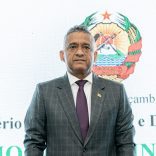Mozambique: Annual deficit of over €500M to repair roads
Mozambique yields hit record after admitting debt distress – Bloomberg

Mozambique’s bonds tumbled after the African nation, home to some of the world’s richest gas reserves, stunned investors by declaring a state of debt distress.
The former Portuguese colony will need to restructure its debts with the hope that the International Monetary Fund will resume aid, according to a 20-page presentation posted late Tuesday afternoon on the Finance Ministry website.
Creditors will be reluctant to have that conversation and take the heavy losses, though the alternative is default.
President Filipe Nyusi’s government this year already restructured more than $800 million in loans it received for a fleet of tuna-fishing vessels, repackaging the debt as $727 million of Eurobonds. To restructure the securities, it will have to convince investors, such as Lutz Roehmeyer, who bought about $1 million worth of tuna bonds in 2014 and 2015, who believe they were tricked.
“They couldn’t keep their budget under control, and it’s their fault, not the fault of the bondholders, and I don’t have any mercy for the officials,” said Roehmeyer, who helps oversee about $12 billion in assets at Landesbank Berlin Investment.
He said he began buying tuna bonds when the ratio of debt to gross domestic product appeared to be low.
“Now we know why, because they were fake,” he said.
One of the world’s poorest nations, Mozambique was counting on one of the biggest gas discoveries in decades to power an economic boom. But the combination of excess borrowing at a time of depressed commodity prices and plunging foreign investment have arrested growth in the southern African country.
Tough Choice
The country’s debt ratio will reach almost 113 percent of GDP this year after $1.4 billion in previously undisclosed loans were uncovered in April, the IMF said. In its presentation, the finance ministry took an even grimmer view, putting it at 130 percent of GDP.
Yields on the bonds, due in 2023, jumped as much as 583 basis points Tuesday to a record 21.11 percent in Maputo.
“The debt-sustainability situation in Mozambique is completely dire,” Robert Besseling, the Johannesburg-based executive director at business-risk consultancy Exx Africa, said by phone. “I cannot imagine that the bondholders will be delighted by this, but obviously a restructuring will be better than taking a haircut or potential defaults.”
In an effort to get a lifeline from the IMF, Mozambique appointed Lazard Freres SAS and White & Case to start talks with creditors “in coming days,” it said. Aiming to conclude a deal with the IMF by early 2017, the government plans to reach an in-principle agreement with creditors on a “debt-resolution proposal” in December, and implement the restructuring in January, according to the ministry.
“I don’t think it’s a realistic timeline,” Besseling said. “Just given the deterioration in the financial and economic situation, it is unlikely that any of this debt will be restructured in that time line.”
Aid Suspension
The IMF suspended aid to Mozambique after the $1.4 billion debt was uncovered in April, and said it would only resume financial assistance after an independent, international audit was completed on the loans. Bilateral donors also halted aid.
Mozambique outlined in the presentation how it’s relying on gas revenue to help pay back the debt. But those fields won’t start to generate royalties and taxes until 2021, leaving the nation short of money to repay creditors over the next four years. A coupon payment of $38 million is due in January, while the country’s repayment capacity in 2017 is $25 million.
In the document, the government told creditors that Italy’s Eni SpA is expected to make its final investment decision on the $8 billion Coral floating liquefied natural gas project at the end of this year, while Anadarko Petroleum Corp. of the U.S. could decide in 2017 on a $12 billion onshore project to export the fuel.
‘Little Faith’
If there are no delays, those projects would “significantly increase” the country’s payment capacity and boost government revenue by an average $2 billion a year between 2021 and 2025, the document showed.
Finance Ministry spokesman Rogerio Nkomo didn’t immediately respond to an e-mailed request for comment.
With exports collapsing and its dependence on imports rising, the IMF predicts Mozambique will run a current account deficit of 146 percent of GDP by 2021, compared with 33.5 percent this year. That would be the highest, by far, in the world.
Roehmeyer said he has little faith in the oil and gas projections after this “big, unpleasant surprise.”
“Officials already knew when they restructured the sovereign debt in the beginning of 2016 that the debt figures were false and they misled investors,” he said.













Leave a Reply
Be the First to Comment!
You must be logged in to post a comment.
You must be logged in to post a comment.